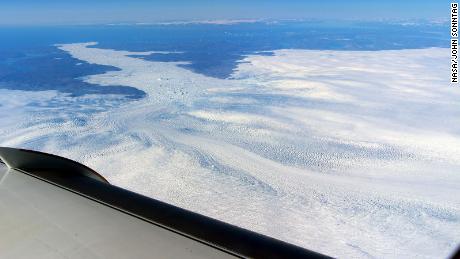Glaciers have lost over 9,000 billion tons of ice between 1961 and 2016, according to a research letter published in the journal Nature on Monday.This amounts to a block of ice the size of Germany and almost 100 feet thick, or the size of the United States and 4 feet thick, said lead author Michael Zemp."Under current loss rates we are going to lose glaciers — basically all glaciers — in several mountain ranges," said Zemp, who is a lecturer in glaciology at the University of Zurich.This ice loss has also meant global sea levels increased by up to 27 millimeters over the time period, said the letter, which was authored by 15 international scientists. This accounts for between 25% to 30% of the observed increase in global sea levels. In this latest research, the team used data from over 19,000 glaciers, including satellite observation and 450 field visits. That's far more than previous studies, which Zemp said relied on data from around 500 glaciers. Glaciers are "icons of climate change," the authors said, and the research suggests glacier loss may be larger than previously reported. In addition to raising sea levels, Zemp said that melting glaciers can destabilize mountain ridges. Glaciers can also be an important water source for agriculture. For example, in the Peruvian Andes, he said, households depend on local glacier water in dry seasons. By comparing current ice loss rates with remaining ice volume the researchers found that glaciers in several regions, including in the European Alps, New Zealand and Western Canada, will disappear within this century. "But behind that there is a second bad message," said Zemp. That mesage? In more heavily glaciated regions, such as the Canadian Arctic, the melting of glaciers has only just "kicked in," meaning that these glaciers will continue to raise sea levels beyond 2100.Glaciers in other regions, such as the European Alps and New Zealand, also saw significant ice losses, the study said, but they played a small role when it comes to rising global sea levels because of the regions' small glacierized areas.Currently, up to 335 billion tons of ice are lost each year, the study found. TRead More – Source
By comparing current ice loss rates with remaining ice volume the researchers found that glaciers in several regions, including in the European Alps, New Zealand and Western Canada, will disappear within this century. "But behind that there is a second bad message," said Zemp. That mesage? In more heavily glaciated regions, such as the Canadian Arctic, the melting of glaciers has only just "kicked in," meaning that these glaciers will continue to raise sea levels beyond 2100.Glaciers in other regions, such as the European Alps and New Zealand, also saw significant ice losses, the study said, but they played a small role when it comes to rising global sea levels because of the regions' small glacierized areas.Currently, up to 335 billion tons of ice are lost each year, the study found. TRead More – Source
[contf] [contfnew] 
CNN
[contfnewc] [contfnewc]






